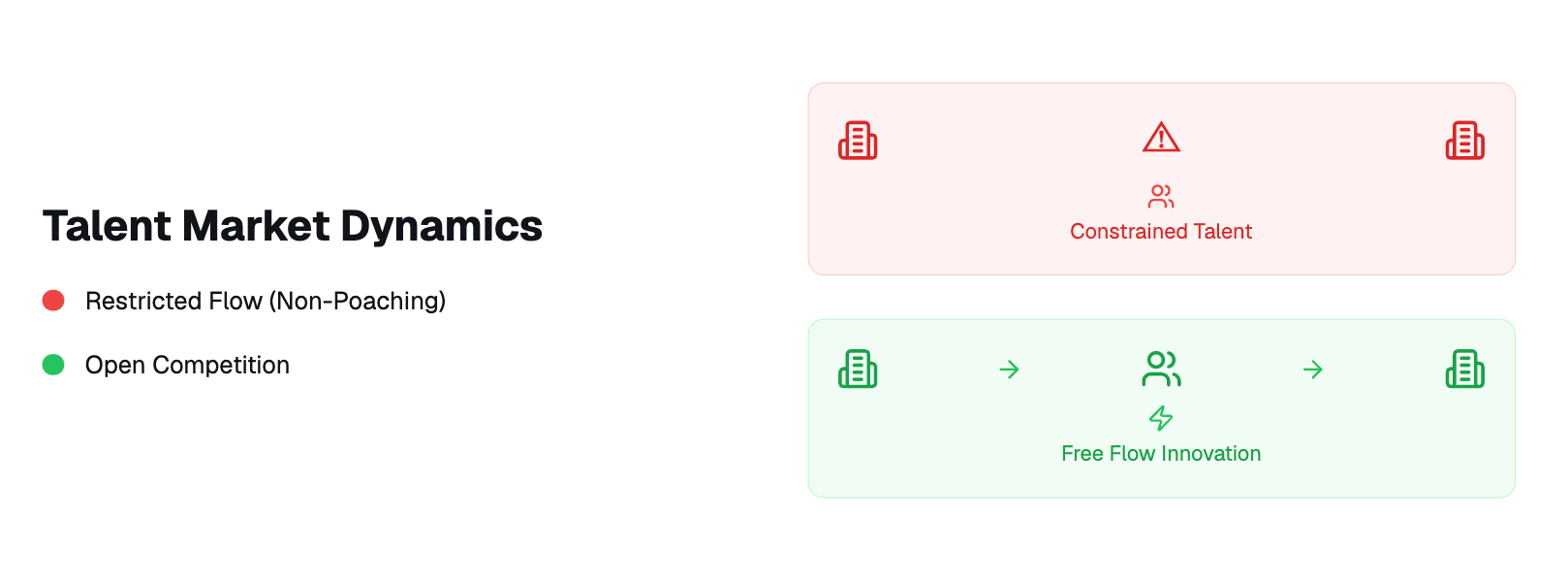Let the Free Market Win

Why non-poaching agreements hurt everyone in the French tech ecosystem

The French tech ecosystem has been maturing rapidly over the past few years. Yet some practices from an older business playbook persist, creating friction that ultimately damages both companies and employees. One such practice deserves scrutiny: non-poaching agreements between companies and the informal "blacklists" that often accompany them.
Last week, we found ourselves in a situation that crystallized this issue. A company leader contacted us claiming we had "poached" one of their employees. It turned out the person had actually applied to us directly, drawn by their experience using Dust at their current company. The accusation was unfounded, but it raised a broader question about how we approach talent competition in the French market.
The conversation revealed something more concerning: the existence of informal agreements between companies not to hire from each other, backed by threats of "blacklisting" competitors who don't comply. This practice, while perhaps intended to create stability, actually creates the opposite effect.
The Legal Landscape is Shifting
Non-poaching agreements between employers are already per se illegal under US antitrust law and subject to criminal prosecution. The Department of Justice and Federal Trade Commission issued updated guidelines in January 2025 that treat such agreements as anticompetitive regardless of their form—whether written, oral, or implicit.
The logic is straightforward: when companies agree not to compete for each other's employees, they're fixing the labor market. This reduces workers' bargaining power, suppresses wages, and limits career mobility. The DOJ has successfully prosecuted executives for these practices, treating them as seriously as price-fixing cartels.
France is likely to follow this direction, particularly as EU competition authorities increasingly focus on labor market competition. The writing is on the wall: agreements that restrict employee mobility will face legal challenges.
Beyond Legal Compliance: Why It's Bad Business
The legal arguments are compelling, but the business case against non-poaching agreements is even stronger.
First, they protect weak performers at the expense of strong ones. When companies can't compete for talent, they lose incentive to create better working environments, offer competitive compensation, or build compelling missions. Mediocrity gets protected by artificial barriers rather than excellence being rewarded by market forces.
Second, they hurt the employees they claim to protect. A software engineer locked into a company through artificial barriers rather than genuine engagement is not a happy engineer. Retention should come from building something people want to be part of, not from limiting their options.
Third, they damage the ecosystem's competitiveness. Silicon Valley thrives on talent mobility—engineers move between Google, Apple, and startups, cross-pollinating ideas and spreading best practices. Attempting to artificially constrain this flow weakens everyone.
Our Position
At Dust, our stance is simple: we compete for talent the same way we compete for customers—by building something worth joining. We focus on creating an environment where exceptional people can do their best work on problems that matter. When someone chooses to work with us, it's because they believe in what we're building, not because their other options were artificially limited.
We don't participate in no-poach agreements, formal or informal. We don't maintain blacklists of companies whose employees are "off-limits." And we don't retaliate against companies whose employees choose to join us.
This isn't naivety about business competition—it's recognition that artificial constraints make everyone weaker. The French tech ecosystem will reach its potential when companies compete on merit, not through backroom agreements that constrain choice.
The Path Forward
The solution isn't complex regulation or industry councils. It's companies choosing to compete openly and fairly for talent. When someone exceptional wants to join your mission, the right response is to ask why they're attracted to it—and then double down on making that value proposition even stronger for your existing team.
The future of work will be defined by organizations that can quickly adapt, learn, and execute. This requires attracting and retaining exceptional people through genuine engagement, not artificial barriers. Companies that navigate this transition well will build sustainable competitive advantages. Those that rely on anti-competitive practices will find themselves obsolete.
The conversation that prompted this reflection ended with mutual understanding and no hard feelings. That's how these situations should resolve: through direct communication and respect for market dynamics, not through threats or informal boycotts.
Let the free market win. Everyone benefits when talent flows to where it can create the most value.

